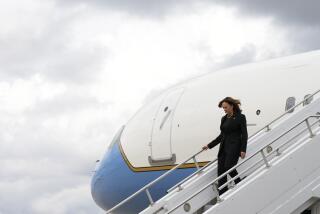UPHEAVAL IN ROMANIA : Nationalist Turmoil Could Concern U.S. : Romania: Officials cite lack of democratic traditions in East Bloc country. Overthrow may affect Moscow more than Washington.
The United States on Friday welcomed the bloody ouster of Romania’s Nicolae Ceausescu as the end of the last major Stalinist regime in Eastern Europe, but it was a welcome tinged with concern.
Romania, without a democratic tradition, faces greater risks of violent nationalist-led turmoil in coming days than any of the other former Soviet Bloc states, U.S. officials believe.
Such turmoil could produce problems for the Bush Administration--and even more serious difficulties for Soviet President Mikhail S. Gorbachev.
“We have to stick to our principle that democratic change was overdue in Romania and we’re glad to see it,” one senior Administration official said. “But other factors there might have to be coped with now--such as nationalism, which is replacing (Communist) ideology as the driving force in Romanian society.”
Stephen Szabo, a Romanian expert at National Defense University, agreed: “I’m afraid we won’t see the same kind of soft landing we’ve seen in the rest of East Europe.”
One disturbing possibility is that the violent tactics that Ceausescu employed in his final desperate bid to retain power could beget further violence in return.
A “counterterror backlash” could develop in the wake of the apparent massacre of demonstrators and the vicious fighting between the army and security forces, in the view of Raymond Garthof, a former U.S. ambassador to Romania.
“This is the first time an old government has used force to try to prevent change” since the Communist regimes of Eastern Europe began to crumble, he noted.
And U.S. analysts are concerned that the implications of Ceausescu’s overthrow are likely to prove even greater for Moscow than Washington. There is danger of a Communist Party backlash against Gorbachev, the senior U.S. official said.
Hard-liners have been routed throughout the once-monolithic Communist world of East Europe, but “Gorbachev is now the one guy who still has major conservative opposition. Will those people get scared that things are going too fast, that all of East Europe now seems to be suddenly marching westward?” the official said.
“The United States has been careful not to emphasize this, to gloat over it, but (Communist Party) conservatives in Moscow and the Soviet people themselves may become angry that Gorbachev’s policies are costing them” the fruits of their victory in World War II, he said.
The White House, in a relatively low-key response seemingly tailored to that concern, issued a measured statement on Friday’s events.
“A terrible burden of dictatorial rule has been lifted from the Romanian people,” it said. The United States rejoices with them, it added, “and joins them in their hopes for a peaceful transition toward democracy” after the “brutal repression of the Ceausescu dictatorship.
“We hope the Romanian government would now move quickly to respond to the desire of its people for a democratic change and that it will commit itself to a peaceful transition. . . . If Romania moves along the path of genuine democracy, the United States pledges its strong support and assistance. We hope that Romania will soon join the other countries of Eastern and Central Europe, which have ushered in a new era of cooperation between East and West.”
Marlin Fitzwater, the White House spokesman who read the statement, said that U.S. food and other assistance might be offered to Romania “once reforms are made.”
Washington’s expression of satisfaction over Ceausescu’s fall is laden with irony. Despite his brutally repressive domestic policies, he was long treated by Washington as the darling of East European leaders because during his 24 years, he refused to follow Moscow’s foreign policy line.
Ceausescu condemned the Soviet invasion of Czechoslovakia in 1968, for example, and maintained diplomatic relations with Israel after the 1967 Arab-Israeli war.
But as U.S.-Soviet relations improved, the oppressive nature of the Ceausescu regime received more U.S. attention, including its Stalinist-like treatment of Hungarians and other minority groups in territories that Romania took over after World War II.
Thomas W. Simons Jr., a senior U.S. diplomat who served in Bucharest, noted the “historical symmetry” of Poland and Romania being the first and last East European states, respectively, to dislodge Communists from power (except for the small, hard-line Stalinist state of Albania).
They were the two nations of East Europe where Stalin directly imposed Communist regimes immediately after World War II, rather than allow a few years of political pluralism, because he stole parts of their territory--Bessarabia and Eastern Poland, respectively--and because both had very small Communist parties that seemed incapable of attracting support.
The Communist rulers of Poland were most tolerant of opposition and were thrown out first in the major upheaval that is racking East Europe, while Romania was last because Romanian Communists were least tolerant, according to Simons, who is diplomat-in-residence at Brown University.
Despite their initial lack of popular support, the Romanian Communists wrapped themselves in the mantle of nationalism to retain their grip on power.
Ceausescu turned upon the Soviets in foreign policy while slavishly following Stalinist economic development models even after Moscow discarded them.
The paradoxical result was that Romania remained closely tied to Moscow economically, Simons said, while it was independent in foreign policy.
Ceausescu also imposed harsh living conditions on Romanians to pay off foreign debts.
“He paid off the debts but the people went hungry and Romania has been starving for capital investment,” a U.S. official said. “That’s why there was this enormous popular demand for reform.”
Hungarian diplomats here expressed concern that Romanian nationalism might turn against the almost 2 million ethnic Hungarians living in that country. But U.S. officials said that they saw no signs yet of such a reaction.
More to Read
Sign up for Essential California
The most important California stories and recommendations in your inbox every morning.
You may occasionally receive promotional content from the Los Angeles Times.










